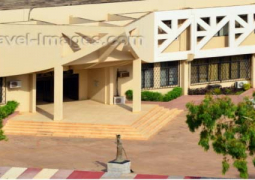
The
Gambian economy has witnessed several setbacks in recent years that culminated
to low growth output of 2.2 per cent in 2016, compared to 4.3 per cent in 2015,
a press release by the Ministry of Finance and Economic Affairs has stated.
The
release issued at the weekend, stated:
“This low growth is the result of shocks in major sectors of the Economy
– Agriculture and Tourism. The low performance in these two sectors combined
with increasing poor performance in state owned enterprises has resulted to an
unsustainable level of public debt of about 108 per cent of GDP as at end 2016.
“The
composition of the public debt is a cause for concern with more than 60 per
cent of the debt in domestic treasury bills with high interest rates. Over the
years, domestic resource mobilization
efforts has led to significant
increase in both tax and non-tax
revenues, however, the growing level of
expenditures have overstretched revenue
growth – especially from the late part
of 2014 to 2016. Inflation has also picked up since the late part of 2015,
reaching 8.9 per cent in 2016.
“Efforts
are currently being made to return to fiscal sustainability through strong
fiscal action to bring expenditures in line with resources availability while
securing donor assistance to drastically reduce domestic borrowing and interest
cost.
“In
light of these developments, government intends to restore fiscal
sustainability by adopting, but not limited, to the following policies:
“Periodical
review of fuel prices, aimed at maintaining a full pass-through at all times.
The
government has restructured its public debt by changing the composition of the
debt profile and this action has helped to reduce the interest cost of debt on
the budget. Furthermore, government intends to secure external financing that
are asserted to be fiscally sustainable in line with our macroeconomic
stability framework. Hence no new
external loans shall be contracted if they are assessed to be fiscally
unsustainable.
“We
are in the process of revising the 2017 budget to reduce expenditures by about
1 per cent of GDP. This will be a difficult choice but has to be done to ensure
that expenditures are aligned with our new macroeconomic policy direction.
“To
eliminate ghost workers, we have launched staff audits and this exercise shall
be completed in May 2017. The exercise could deliver substantial savings in the
budget and would provide a sound basis for a more comprehensive civil service
reform.
“In
reforming State Owned Enterprises, the government plans to conduct forensic
audits of all SOEs to uncover all frauds, embezzlement of funds in the past,
stop leakages and strengthen SOE oversight going forward.
“The
audit process is expected to focus on five SOEs that have been mostly affected
by financial mismanagement of the previous regime.”
Source:
Ministry of Finance and Economic Affairs


